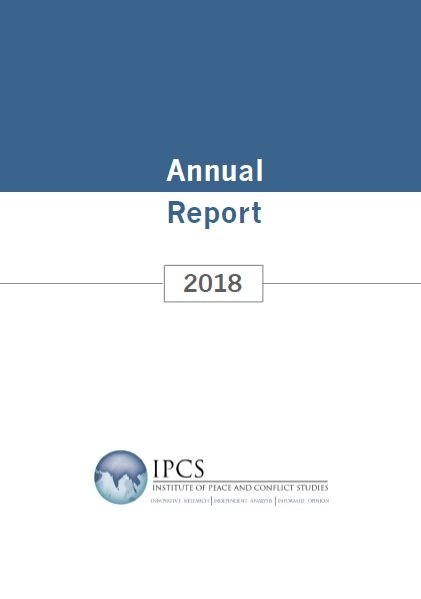IPCS Annual Report 2018
Introduction
The old rulebooks - if there are such things for think-tanks - were
dispensed with at the close of 2017.
Instead, we set our goals based solely on who we are, what we seek
to do, and how best to leverage our collective skill-set and the resources at
our disposal. These parameters contributed to the framework that steered our
activities through 2018.
One, we fortified our core research areas and expanded the scope of
work to more comprehensively include West Asia and the European Union
geographically; and international law, the fourth industrial revolution,
hydropolitics and hypdrodiplomacy, refugees and immigrants, and gender, thematically. This endeavour to more closely reflect
evolving global geopolitical realities manifested in the form of publications,
discussions, podcasts, and in Reelpolitik,
IPCS' monthly film screenings. Some of these projects are carrying over into
2019.
Two, we chose to focus on conducting smaller, compact roundtables
over 'events', based on the observation that these contribute to more
substantial discussions. The 25 seminars and roundtables held in 2018,
including the twelfth annual Germany-India-Brazil-South Africa (GIBSA)
Quadrilogue, were implemented in this format. The GIBSA conference on The Evolution of Multilateralism was
held at the track 1.5 level this year, and featured a breakaway, student-led
seminar in JNU, organised in collaboration with the Centre for International
Politics, Organisation and Disarmament (CIPOD).
Three, we laid emphasis on inter-disciplinary collaboration to
address some of the consequences of siloisation, or the lack of
interdisciplinary analysis that think-tanks and academia often represent. In
2018, we worked to instrumentalise our research through engagement with the
fields of law and science and technology. Of these efforts, our collaborations
with the National Law School of India University (NLSIU), Bengaluru, and
Government Law College (GLC), Mumbai, and the Women, Peace and Security Series are
relevant examples.
Four, we aimed—and were successful—in better using social media to
amplify outreach and build more robust engagement with digital constituencies
in India and elsewhere.
Five, while continuing the tradition of innovation in
policy-oriented research representative of a cross-section of analysis from
across the world, we recognised the importance of showcasing this in different
formats, particularly at a time when the audience for the long-form is both
shrinking and evolving. We increased the number of podcasts—featuring short
interviews with subject-matter experts—that were commissioned
through the year. Reelpolitik, IPCS'
monthly platform for the study of security issues through visual representation,
was similarly strengthened. This visual medium has been instructive in providing
insights into the complexities that inform strategic analysis, and has expanded
these critical conversations to a wider audience of stakeholders.
Finally, IPCS' emphasis on the capacity building of the next
generation of emerging specialists continued as before. Its internship
programme, which offers scholars and graduates an opportunity to observe
geopolitical and security developments from an Indian perspective and training
in policy analysis and writing, and facilitates their access to Delhi's
strategic community, was busy this year. IPCS hosted 16 interns from
universities and institutions in India, the Netherlands, Spain, the US,
Belgium, and the UK.
I invite you to read, in more detail, the range of activities
undertaken by IPCS in 2018 in the following pages of its Annual Report, and as
always, welcome your feedback at ruhee.neog@ipcs.org.
On behalf of IPCS, my very best wishes for the year, and I thank you
for your continuing support.
Ruhee Neog
Director, IPCS
Read More


